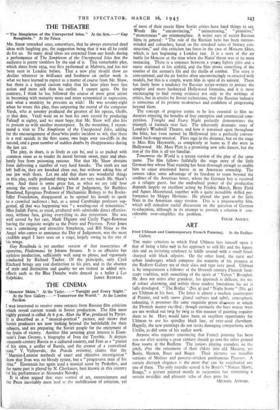THE CINEMA
"Moscow Skies." At the Tatler.—" Tonight and Every Night." At the New Gallery.—" Tomorrow the World." At the London Pavilion.
I WAS interested to receive some extracts from Russian film criticism which reveal current trends in Soviet production. The film most highly praised is called At 6 p.m. After the War, produced by Pyriev. It is described as a " musical-poetical " picture, and shows that Soviet producers are now looking beyond the battlefields for their subjects, and are preparing the Soviet people for the enjoyment of the fruits of victory. Another film arousing great interest is Eisen- . stein's Ivan Grozny, a biography Of Ivan the Terrible. It depicts sixteenth-century Russia as a cultured country, and Ivan as a "patriot of his time, a unifier of Russia, and the creator' of a centralised state." V. Vishnevski, . the Pravda revieWer, claims, that the "Marxist-Leninist methods of exact and objective investigation" show that Ivan was no bloody tyrant, but a "progressive man of his time." Eisenstein has again used a musical score by Prokofiev, and the name Part is played by N. Cherkasov, best known in this country for his performance as Alexander. Nevsk;
It is often argued that- state control of art, entertainment and the Press inevitably must lead to the stultification of criticism, yet of most of their recent 'films Soviet critics have hard things to say. Words like "unconvincing," "uninteresting," "primitive," "monotonous-a" are commonplace. A writer says of recent Russian films in general: "The role of the Russian hero has been narrow- minded and colourless, based on the standard rules of literary con- struction," and this criticism has force in the case of Moscow Skies, which. is just beginning a London run. It is a story of the air battle for Moscow at the time when the Nazis' threat was at its most menacing. There is a romance between a young fighter pilot and a nurse stationed at his airfield, and the film shows something of the routine of the airman's life and the thrills of combat. The story is - conventional, and the air battles often unconvincingly re-enacted with models, but this is a simple, warm film in spite of its naiveté. There has lately been a tendency for Russian script-writers to jmitate the simpler and more hackneyed Hollywood formulae, and it is most encouraging to find strong evidence not only in the writings of critics, but in articles by Soviet technicians, that the Russian industry is conscious of its present weaknesses and confident of progressing beyond them.
The concept of progress seems to be less essential to film in- dustries enjoying the benefits of free enterprise and commercial com- petition.' Tonight and Every Night perfectly demonstrates the triumph of formula over fact. The inherently dramatic story of London's Windmill Theatre, and how it remained open throughout the blitz, has been turned by Hollywood into a perfectly conven- tional back-stage musical. Fires rage in the distance, but on the stage is Miss Rita Hayworth, as completely at home as if she were in Hollywood. Mr. Marc Plan is a promising new solo dancer, but the rest of the film is all too familiar.
Tomorrow the World is a screen version of the play of the same name. The film follows faithfully the stage story of the little German boy whose Nazi training has been thorough enough to enable him to cause emotional havoc in an American township. The camera takes some advantage of its freedom to roam beyond the confines of the American home, where the German boy is received ,as a refugee guest, but the undoubted power of the production depends 'largely on excellent acting by Fredric March, Betty Field and Agnes Moorehead, together with a quite incredibly skilled per- formance by Skippy Homeier. He played the. part of the little Nazi in the American stage version. This is a praiseworthy film, which will stimulate useful discussion on the question of German re-education, although in its attempt to provide a -solution it con- siderably over-simplifies the problem. • EDGAR ANSTEY.


























 Previous page
Previous page